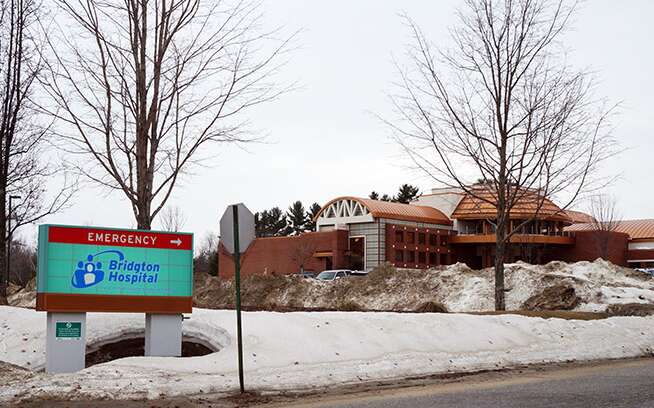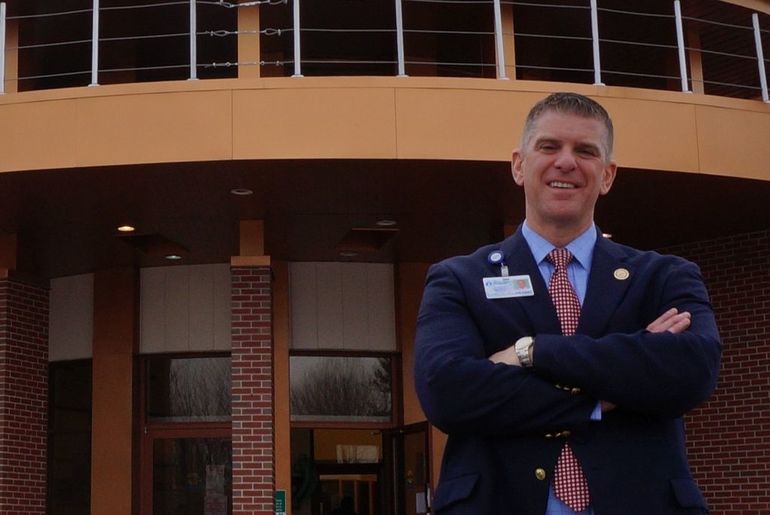
New president of Bridgton, Rumford hospitals came prepared for the challenges ahead
 Photo / Maureen Milliken
Peter Wright, president of Bridgton and Rumford hospitals, stands outside Bridgton Hospital. He began in the role last month.
Photo / Maureen Milliken
Peter Wright, president of Bridgton and Rumford hospitals, stands outside Bridgton Hospital. He began in the role last month.
When Peter Wright was 11, his mother, newly single, moved with him and his sister to New Jersey and bought a restaurant.
She had no experience, but she was a great cook and had “enormous heart,” Wright said.
She also knew the value of customer service.
“I learned that everyone who came through that door was the key to my survival, my mom’s survival, the restaurant’s survival,” Wright, president of Bridgton and Rumford hospitals, said as he sat in his Bridgton Hospital office 35 years later.
The lessons he learned from his mother’s experience have served him well in a career that has increasingly become pulling rural New England hospitals out of the fire.
Wright was named president of Bridgton and Rumford hospitals, part of Lewiston-based Central Maine Healthcare, in January and has been in the post since last month.
It’s a position many people would not have embraced — he stepped in after nearly a year of turmoil for the health care system, and Bridgton Hospital in particular.
He took over the position from David Frum, who resigned in August after the medical staffs in Bridgton and Rumford voted no confidence in CMH CEO Jeff Brickman.
In February, before he officially took his position, he was in front of the Bridgton Board of Selectmen as a packed room listed to Wright defend the system in the face of a citizens group that wanted the town, and others in the region, to find a new health care system to run the hospital.
Wright, a former police officer, said he didn’t find the situation daunting — he said that lack of communication had been a problem, but now he feels like he “can’t communicate enough.”
But he also is clear that, as he told selectmen, "three different medical teams in three different communities" is not sustainable.
Besides the two hospitals, the health care organization owns Central Maine Medical Center in Lewiston, several satellite facilities, and the new Topsham Care Center, which combines urgent care, diagnostic and lab services.
As Wright sat in his office recently, he said that the community should know it’s being heard, but also that the health care system’s changes will make it better.
“What is the most ideal experience for the patient?”
He said the bottom line is to help the community begin to trust the health care system again.
Before he started a career in health care 18 years ago, Wright did a lot of different jobs, including as a ski instructor, a numismatic [he worked in a coin shop] and a Littleton, N.H., police officer. But when he took his first health care job, in operations at Copley Hospital in Morrisville, Vt., it felt right.
In 2007, when he became COO of Littleton (N.H.) Hospital, he came to a hospital that was evolving as a regional provider and big changes were being made. For instance, during his tenure, a new geo-thermal heated 66,000-square-foot building was opened.
The hospital had also undergone some major staff upheaval, and, in one year, hired 14 new physicians.
He said he learned from that experience not only about what’s important when recruiting for rural hospitals, but also how to instill trust back into a community.
By the time Wright moved on the Valley Regional Hospital in Claremont, N.H., in 2013, he was seasoned at hospital operations in rural northern New England. He also had only worked at critical access hospitals — 25 bed or less hospitals that are 35 miles or more away from another hospital and are restricted on length of stay and other elements.
'Off the cliff'
Valley Regional presented its own set of problems.
“The hospital was on the cliff of financial disaster, and we jumped off,” he said. The hospital had “artificially positive” revenues that weren’t going to benefit from a quick fix. He told the board he could turn it around, but it would take three years. After two years of losing money, the hospital emerged from its hole.
He said keys included looking at collaboration in new ways, better recruitment and “hard-wiring” customer service.
“Instead of competing, I said we’re going to embrace collaboration,” he said. Because Valley is close enough to Dartmouth-Hitchcock Medical Center, in Lebanon, N.H., and also Cheshire Medical Center, in Keene, patients had choices.
The hospital wanted patients to feel “we know you here.”
In situations where the patient would be better served by a specialist somewhere else, the local hospital would still have a hand in their care.
He said, too, that most of the staff at a community hospital is from the community. “People are passionate about their local hospital,” he said.
But physicians are often from somewhere else. “If the reasons someone wants to work here is because it’s two hours from Boston, that’s not going to work,” he said. “Those aren’t people who are going to be a part of the community.”
He said the hospital has to focus on recruiting people who embrace rural life and realize that they may run into patients in Hannaford.
“We have to reset the expectations, educate people about the expectations,” he said.
Two hospitals, unique needs

Last August, when Wright’s predecessor Frum resigned, CMH had already starting forming a strategic plan for Bridgton and Rumford.
By the time Wright took over at Bridgton and Rumford, CMH had announced it is opening a Bridgton clinic with primary care and lab services, the first of several "accessible care options" for Lake Region patients.
Wright said that unique changes are also in store for Rumford Hospital, too.
The two hospitals are similar in many ways -- both have 25 beds, both are critical care, and both are among the top 17 Rural Hospitals in the nation, according to the Leapfrog Group.
“Both are hallmark symbols in their communities, representing strength, community and rich history,” he said. “However, they serve two different types of rural communities. Rumford has an active paper mill, and is in many ways more remote than Bridgton. We have to make sure care at Rumford truly reflects the needs of that community -- there is no one-size-fits-all solution.”
One big difference is that Rumford is a mill town, and many are employed or connected with the ND Paper Mill.
Wright said that he’s interested in seeing how Rumford Hospital can partner with the mill to promote wellness, increase access to timely health care, augment safety programs and otherwise promote good health in the River Valley.
'Improvise. Adjust. Overcome.'
Wright said in all of his careers — law enforcement, the ski industry, his mother’s restaurant, and now health care — it all comes back to customer service.
At a community hospital, he said some of that is as simple as helping someone in the hallway who may be there to visit a family member, find what they’re looking for, walk them to the room, make sure they have what they need.
He said he expects staff to give “101%.” “Everyone has a job to do, but take that extra step, work as a team,” he said.
He said that the health care system was guilty of not communicating well as changes came to Bridgton and Rumford, and people in the area, particularly in the communities served by Bridgton Hospital were afraid services would be cut, doctors were leaving in droves and that they weren’t being heard.
He understands that people don’t want to have to travel for health care unless they have to, that they want to be close to home when they’re sick.
He said its important for patients to understand the health care system considers their care its top priority, but as the rules of health care change, delivery of services may change, too. He said that some changes at CMH include more of a focus on primary care at the local level, specialists who will come to the region a couple days a week, and partnerships that may not be the traditional ones.
The whiteboard in his office is topped with a motto: “Improvise. Adjust. Overcome.” It’s from “Heartbreak Ridge,” one of Wright’s favorite movies.
He said it’s a philosophy that lends itself particularly well to rural health care.
He said that he will continue to listen as CMH’s plans for Bridgton and Rumford evolve.
“I don’t think for a minute that I’m always right,’ He said. “I change my mind all the time.”
Wright has spent a lot of time talking to town boards and community members, and feels like the situation that was so volatile just weeks ago has been defused in many ways.
“As people we’re taught to do just about everything, but we’re never taught how to listen,” he said. “It’s a hard skill.”
“I think the message has been heard,” he said. The focus is on, “how can we continue to provide quality care in rural areas.”
Despite the atmosphere he came into, “People have been nothing but welcoming,” he added. “I have yet to meet anyone in the community who hasn’t been welcoming and excited to have me here.”










0 Comments